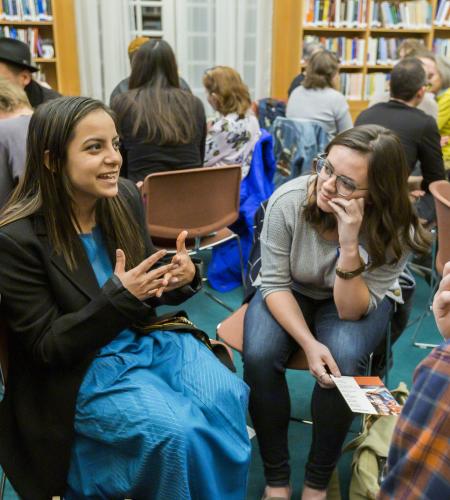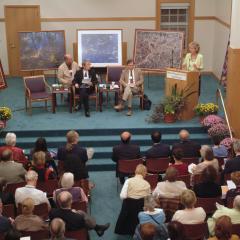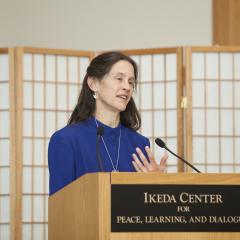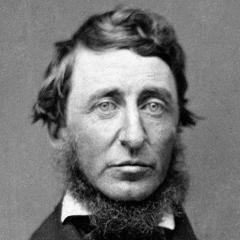In September 2009 the Center held a book release event for the publication of Creating Waldens: An East-West Conversation on the American Renaissance. The first title from the Center’s Dialogue Path Press, it features Daisaku Ikeda in dialogue with scholars Ronald A. Bosco and Joel Myerson. This story by Mitch Bogen reports on key themes from the gathering, including the emergence of the greater self and the importance of questions without apparent answers. The event was especially memorable as it featured the reading of a special message from Mr. Ikeda. Professor Anita Patterson of Boston University offered introductory remarks.
: :
Professors Ronald A. Bosco and Joel Myerson appeared at the Ikeda Center on September 24 not just to celebrate and discuss their new dialogue book co-authored with Center founder Daisaku Ikeda, Creating Waldens: An East-West Conversation on the American Renaissance. They also came to continue the process of what Bosco described as the “intellectual sharing and poetic friendship” that led to the creation of the book. Demonstrating his own commitment to this relationship and process, as well as his respect for the American Renaissance, Mr. Ikeda, who is president of the lay Buddhist organization Soka Gakkai International, composed a moving personal message that was read at the event.
The more than 75 Boston-area community members who attended benefited from insights based on lifetimes of reflection on the subjects explored in the eighteen conversations that comprise Creating Waldens. Professors Bosco and Myerson are leading authorities on the lives and letters of Emerson and Thoreau. Each has devoted decades to promoting deep understanding of these great figures and their writings. A prolific writer and influential proponent of Buddhist humanism and cross-cultural dialogue, Mr. Ikeda consistently incorporates the lessons of these great figures into the heart of his humanistic vision. In his introductory remarks, Center advisor Masao Yokota observed that Emerson, Thoreau, and Whitman were Ikeda’s “heroes when he was young,” and that even now, when Ikeda speaks of them, his face “returns to that of the young Daisaku Ikeda.”
Throughout the afternoon, it was apparent that the authors want to instruct, yes, but also to inspire all of us, especially our young people, to emulate the reverence for nature, poetry, and self-knowledge so valued by those nineteenth-century seekers.
The Flowering of the Greater Self
In his message, Mr. Ikeda shared how, in the aftermath of the horrible events of September 2001, he renewed his own commitment to dialogue as the true path to peace, especially when it is powered by the “poetic power of the imagination,” which “can create portals of hope and discover entranceways for exchange in the massive walls that divide our world.” He also revealed that he wanted his “first, firm step forward” to be this dialogue with professors Bosco and Myerson, so greatly does he esteem both these scholars and the lessons that the American Renaissance holds for our time.
Their conversations, he said, reaffirmed his belief that unlimited promise and power lies within every individual. Using a phrase popular among Transcendentalists, Ikeda called on people to develop a “self-culture” — one in which people remain true to their deepest commitments and that transforms the very core of being. “What flowers from this self-culture,” he continued, “is not the fragile, forlorn bud of the smaller self but the majestic blossom of the larger self — with its boundless capacity for empathy and understanding.” (Read the full message here.)
For the Sake of Nature – and Poetry
The day also was enriched by the presence of Professor Anita Patterson of Boston University, who offered her own inspiring reflections on Creating Waldens. A valued friend of the Center, having participated in the 4th Ikeda Forum, “Women and the Power of Friendship,” Patterson set an idealistic tone for the day, especially in citing President Ikeda’s comment from the book that “nothing is more beautiful than burgeoning youth.” Drawing on her experience as a university teacher, Patterson remarked on “the importance of this book and this kind of conversation [in] creating a safe, reflective place in the classroom for young people today” — one where they can “enjoy the process of learning again,” freed from the worries of having the right grade or being better then someone else.
Setting the stage for the discussion to follow, she cited sections from the book in which Bosco and Myerson explore the profound benefits that can accrue for young people — and indeed for all of us — when we adopt an attitude of reverence and respect for nature and poetry alike. Patterson quoted Bosco from Conversation Five of Creating Waldens: “Thoreau immersed himself in nature for the sake of nature. … By immersing himself in nature he elevated his experience to poetry.” Nature, like poetry, she added, teaches us “to love not for what we can get out of it.”
Patterson then cited Myerson, also from Conversation Five: “Thoreau’s labor not only provided his food, but also literally rooted him to the earth. He learned about nature while working.” Patterson said that Thoreau’s insight holds a parallel meaning for her own students this semester, who are studying the poetry of the American Renaissance. “There is this way in which labor — the labor of studying and the investment we have in learning to work on poetry, or whatever it is we are working on, eventually will bear fruit in our having a sense of profound rootedness in a tradition.”
A Journey Recalled
The afternoon event marked the return of professors Bosco and Myerson to the Center. Bosco, Distinguished Professor of English and Literature at the University at Albany, State University of New York, presented at the Center’s very first Ikeda Forum for Intercultural Dialogue, “Reawakening East-West Connections: Walden and Beyond.” Myerson, Carolina Distinguished Professor Emeritus of American Literature at the University of South Carolina, presented in the 2nd Ikeda Forum, “‘Talking Back’ to Whitman: Poetry Matters.” Moreover, both helped conceptualize and develop the Ikeda Forum as an annual event series.
During their remarks, both Bosco and Myerson shared warm recollections of their interactions with Mr. Ikeda. Recalling their visit with him at Soka University of Japan in 2001, both men marveled at how he brightened in the presence of the young students there — like “turning on a light bulb,” said Myerson.



